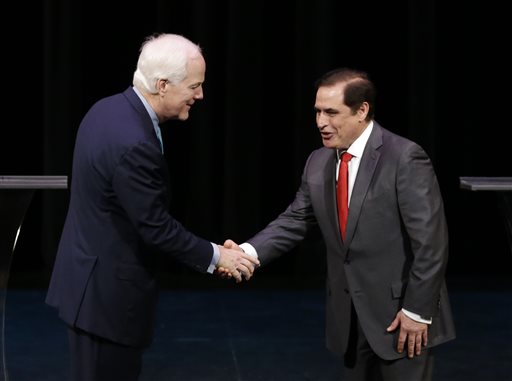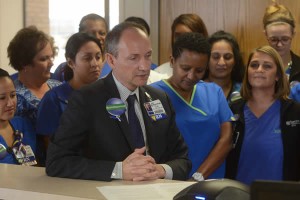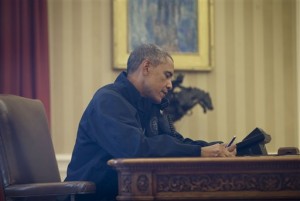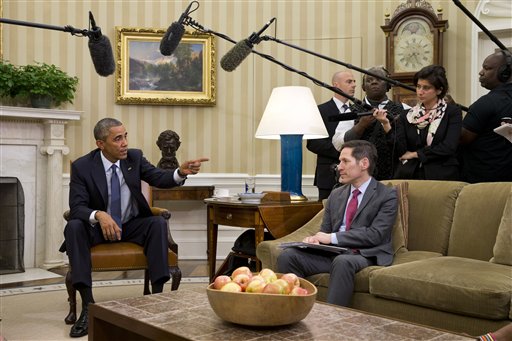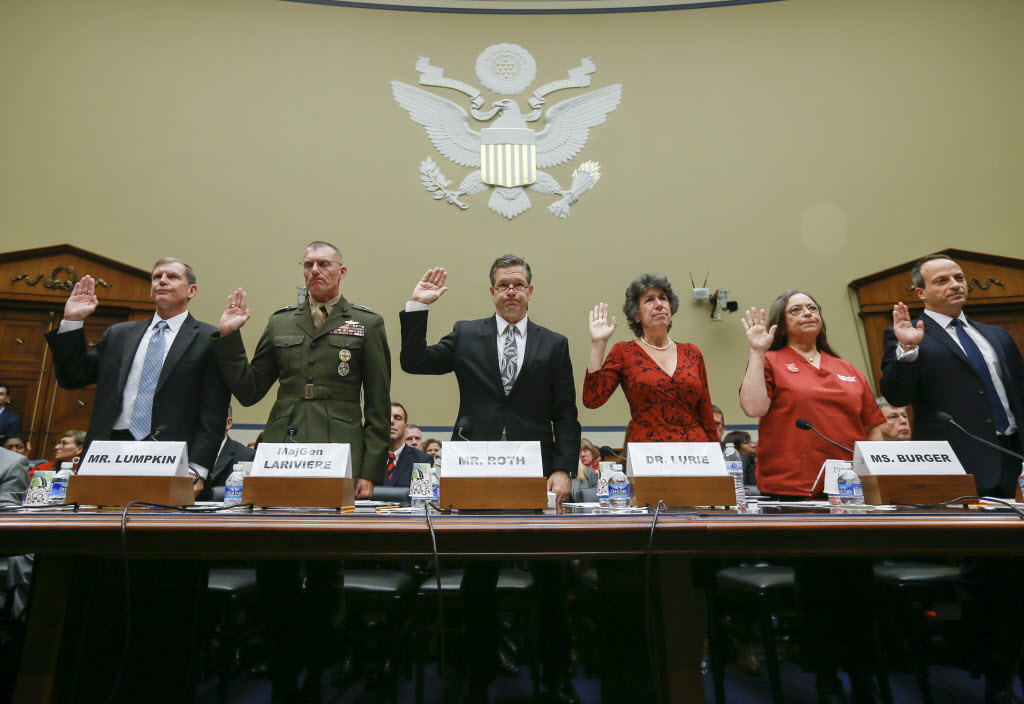
Witnesses are sworn in before testifying on the Ebola outbreak today before the House Committee on Oversight and Government Reform. (J. Scott Applewhite/AP)
Update 12:45
The hearing has concluded.
Issa closed by emphasizing the need to fight Ebola in West Africa.
“There is no way that every American is going to place themselves in a hazmat suit from morning until night. We will have to go to the source,” he said. “This disease will not be eradicated if we wait until it comes to our shore.
Update 12:30:
Mica called for Lurie’s resignation, citing a lack of “preparedness” on the part of agencies responsible for responding to the Ebola outbreak.
“Somebody needs to see that we are prepared,” Mica said. “You told me that you’re responsible for preparedness.”
Mica pointed out an internal report by the DHS which said that the agency was unprepared to deal with pandemics. The report said that poor auditing practice had left the agency without a true sense of its ability to respond to emergencies.
Lurie, who works for the Department of Health and Human Services, said that she has doesn’t authority over DHS practices and policies.
Update 12:15:
After Rep. Justin Amash (R-Mich.) beat the drum for a travel ban, Rep. John Mica (R-Fla.) offered another solution: quarantine anyone coming from West Africa.
“People need to be quarantined coming out of those countries. You don’t need a travel ban, you need to go to the people who pose a risk,” Mica said.
On Tuesday, the Department of Homeland Security announced new screening standards for anyone coming from West Africa. Those passengers will now be routed through one of five major airports for additional screening, and they will be monitored for 21 days after their arrival.
Mica said the fact that that Spencer made it through the additional screening and was later diagnosed with Ebola shows that the new measures are not working.
“The testing at the airport is not working. We need a quarantine in place,” he said.
But a quarantine could make it even more difficult to recruit healthcare workers to West Africa, according to Rabih Torbay, senior vice president of International Medical Corps.
Torbay said that his organization is already struggling to get doctors and nurses to come to West Africa. Adding an additional three-week quarantine to their period of service would make it even harder.
Update 11:40:
Houston Republican Blake Farenthold, the lone Texan on the committee, questioned whether building hospitals for Ebola patients was a job for the U.S. military.
“Traditionally, the military’s job has been to protect this country with guns and bombs,” Farenthold said. “Is this really what the military was designed for?”
Farenthold said that the task seemed more appropriate for a group like the Peace Corps, or a private contractor.
Update 11:30:
It took nearly three hours, but travel restrictions for people coming from West Africa have been discussed.
“I don’t understand why we don’t put a travel restriction in place,” said Jason Chaffetz (R-Utah).
Chaffetz also called for anyone who has been to West Africa to be isolated for 21 days before coming to America — the maximum incubation period for the Ebola virus.
Matthew Duckworth, a Pennsylvania Democrat, supported Chaffetz’s idea.
Troops in West Africa will be monitored for symptoms of Ebola for 10 days before they return to the U.S. Once they return stateside, they will be checked for symptoms twice a day on base for 21 days, but will be allowed to go about their normal schedules otherwise.
Duckworth asked Major General James Lariviere, the DOD deputy director for political-military affairs in Africa, why the troops couldn’t be monitored for 21 days in West Africa.
“Why couldn’t you be a little more careful with the plan, a little more overboard with the protection and extend the in-country waiting period to 21 days?” he asked.
Lariviere said that the DOD’s plan follows protocols established by the Centers for Disease Control and Protection.
Update 11:10:
Rep. Trey Gowdy (R-SC) railed against President Obama’s appointment of Klain, arguing that the job should have gone to someone with a medical background instead of an attorney and political operative.
“Why in the hell did the president pick a lawyer to be the Ebola czar?” he asked Lurie.
Gowdy said that Lurie, given her record as a health professional, would have been better suited for the post than Klain. Lurie steadfastly supported Obama’s choice.
“I have a lot of confidence in Mr. Klain,” she said. “There are a tremendous number of doctors that he has it his disposal.
Gowdy didn’t buy it.
“Color me cynical, it just appears political,” he said. “The next time there’s an opening on the Supreme Court, I want you to see whether the president considers a doctor or a dentist for that job.”
Update 10:40:
Rep. Jim Jordan of Ohio peppered Lurie with questions about the NIH budget. The NIH is a branch of the Department of Health and Human Services.
Jordan cited NIH expenses that he saw as frivolous, including:
- $374,000 on “fruit and vegetable puppet shows”
- $53,000 for a study on sighs
- $2 million to encourage elderly people to join choirs
“Couldn’t that have been used for something like Ebola and a potential vaccine?” Jordan asked.
Lurie said that the NIH is currently supporting studies on two vaccines, but added that the “development of vaccine is a long and complicated process.”
Jordan questioned whether those vaccines might be further along had the NIH not spent money on programs like nutrition-themed puppet shows.
“I don’t believe that would be the case,” Lurie responded.
Update 10:10 a.m.:
Rep. John Tierney, a Massachusetts Democrat, just read that Pham had been declared “Ebola-free,” by the National Institutes of Health. Later today, she will be released by the NIH facility in Bethesda, Maryland, where she was being treated. The NIH will hold a press conference at 10:30 a.m. CT today to discuss the news.
Original post:
WASHINGTON — The House Committee on Oversight and Government Reform, chaired by Rep. Darrell Issa (R-Calif.) met this morning for a hearing on the federal government’s response to the Ebola outbreak in West Africa and the U.S.
In his opening statement, Issa said that even though the U.S. has the resources to prevent the spread of Ebola, they haven’t been properly deployed.
“I think we all know that the system is not yet refined to where we could say it is working properly,” he said.
Issa also criticized President Obama for appointing Ron Klain as the Ebola response coordinator, or so-called “Ebola czar.” Issa said that Klain doesn’t have the credentials for the job.
“In my opinion it shows that this administration has on one hand recognized the missteps, and on the other hand is not prepared to put a known leader in charge, or in fact a medical professional in charge,” Issa said.
In West Africa, nearly 5,000 people have died from Ebola during the current outbreak, according to the World Health Organization. Four people have contracted the disease in the U.S.
The most recent U.S. Ebola case was discovered yesterday in New York City when Craig Spencer, a 33-year-old doctor who had treated Ebola patients in Guinea, was diagnosed with the disease.
Witnesses at the hearing emphasized the need to contain the disease in West Africa in order to stop it from spreading around the world.
“We are extremely serious in our focus on protecting America’s health security. The best way to do that is to support the response to the Ebola epidemic in West Africa,” said Dr. Nicole Lurie, the assistant secretary of the Department of Health and Human Services.
The Department of Defense will send 3,200 troops to West Africa in the next few days to build Ebola treatment centers. The contingent will include 500 troops from Fort Bliss in El Paso.
Rep. Michael Turner, an Ohio Democrat, said he was “very skeptical” of the DOD protocols to prevent troops from contracting Ebola in West Africa.
Assistant Secretary of Defense Michael Lumpkin told Turner that there’s little risk of troops in West Africa catching the virus. He said that the mission will focus on fixing logistical problems, not treating patients.
“Direct patient care of Ebola-exposed patients in West Africa is not a part of the DOD mission,” Lumpkin said. “There is no higher operational priority than protecting our Department of Defense personnel.”
Deborah Burger, co-president of nurses’ union National Nurses United, blasted Texas Health Presbyterian Hospital Dallas for its procedures in treating Liberian Ebola victim Thomas Eric Duncan. Two of the nurses who treated Duncan, Nina Pham and Amber Vinson, contracted Ebola.
“This is what happens when guidelines are inefficient,” Burger said.
The union was well-represented at the hearing, its members wearing red stickers reading “I am Nina Pham.”
Burger called for an executive order or congressional action to bolster equipment and training standards for frontline healthcare workers. She cited a nationwide survey of over 300,000 nurses, 85 percent of whom said that they were “not adequately trained” to treat Ebola patients.


